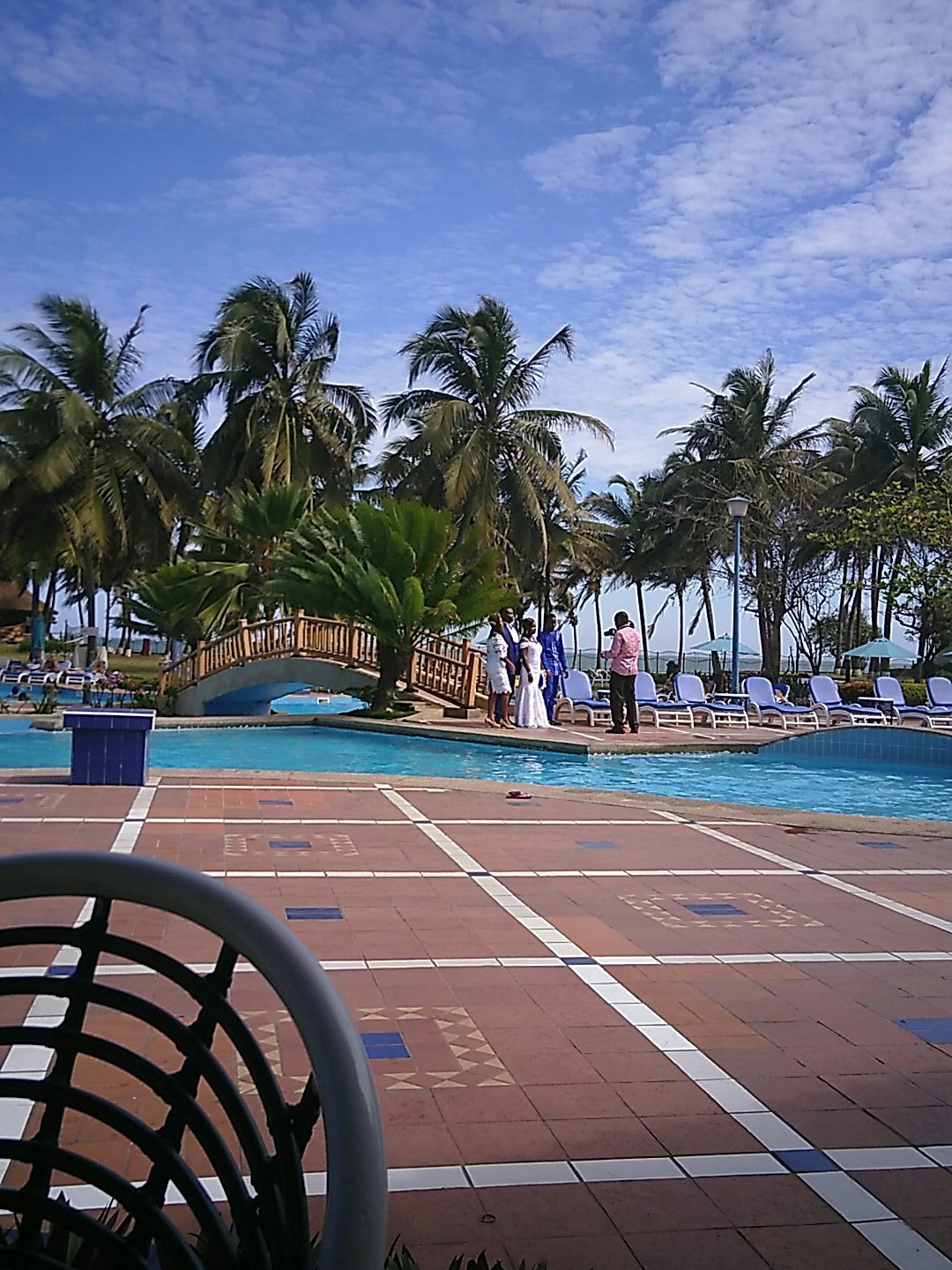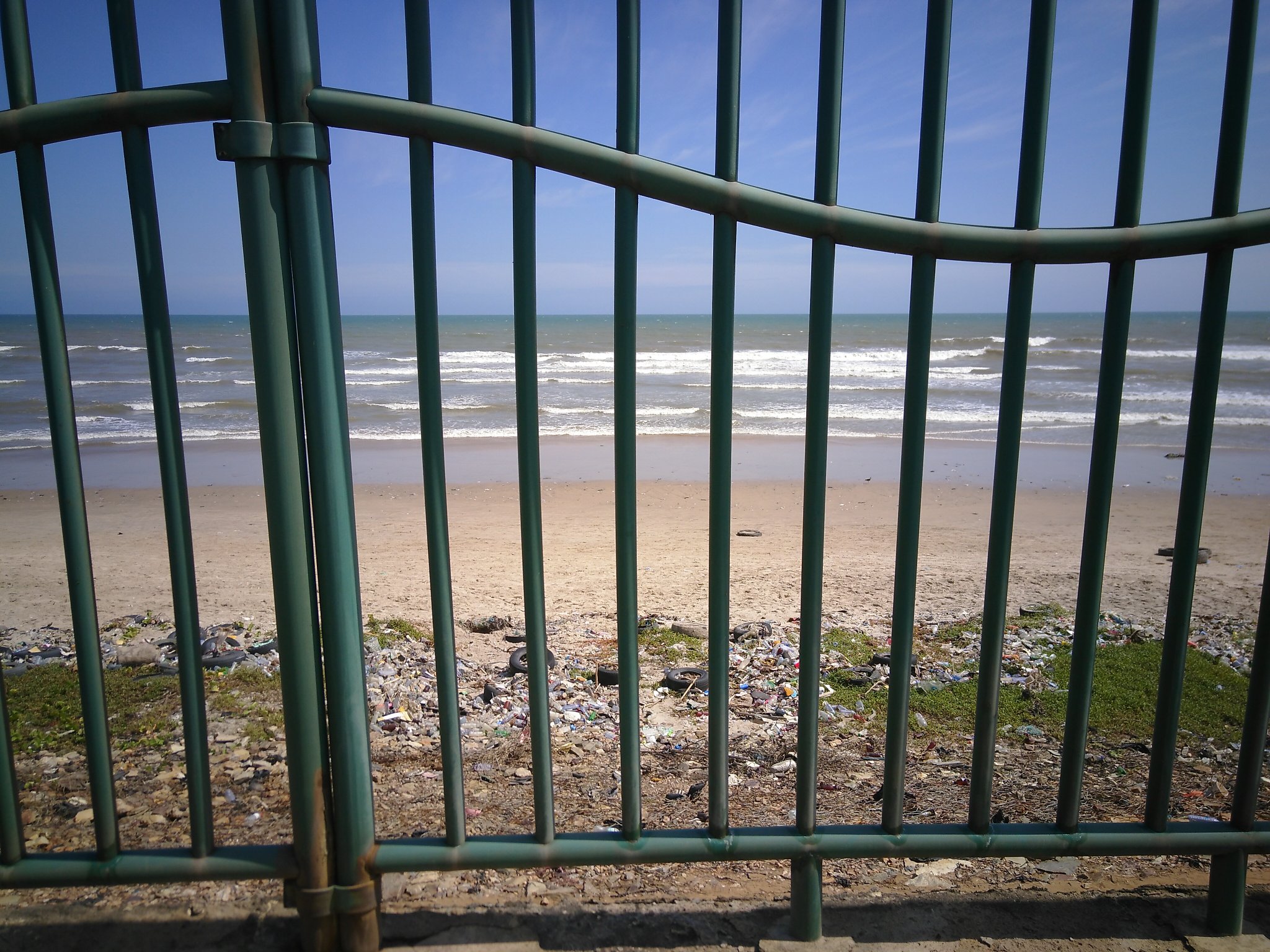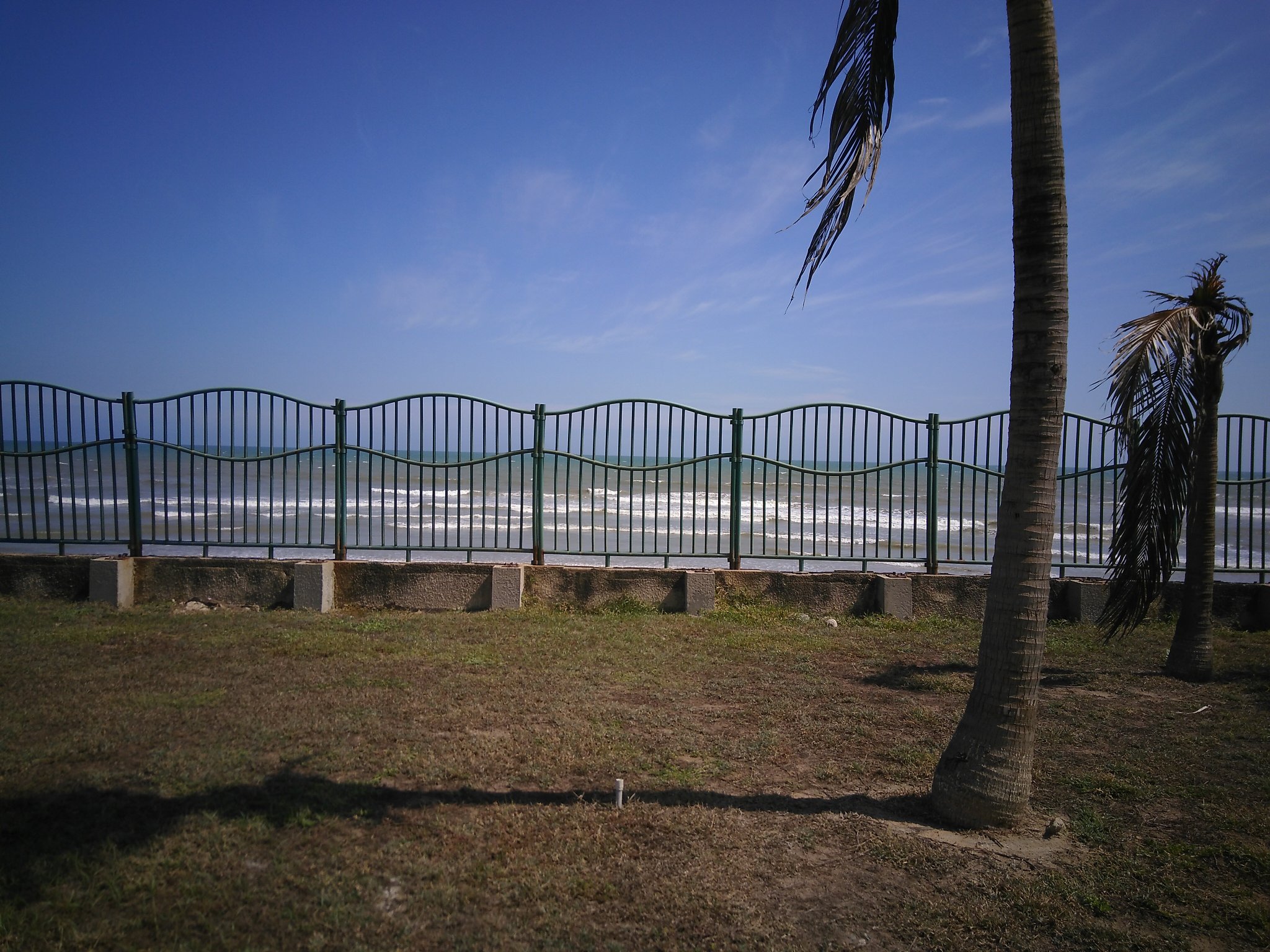The swimming pool at the La Palm Beach Hotel in Accra can only be described as “grand.” Technically, it’s three swimming pools, connected by two bridges and framed by a row of fecund coconut trees (“be aware of falling coconuts!” scream the wooden signs). But it all flows together: the blue-and-white lounge chairs around the pool carefully echo the whites and blues of the pool; with the crashing waves of the Atlantic Ocean in the middle distance, the entire tableau of colors and sounds is carefully built to evoke the beauty of nature, but without the chaos.
On this mild October weekend, a parade of characters gather around the pool: a newly-married couple poses for photographs in full wedding regalia, while hipster couples tan in bikinis just out of frame and fashionable couples push their expensive-looking sunglasses to the top of their heads to take selfies on their smartphones. Children forced into their Sunday Best—who want nothing more than to rip it off, to run and play in the sun, or at least dip their toes in the water—must instead camp out at the family table, while their harried caregiver yells at them to sit upright and to finish their chips, all of their chips.
And then there is me, a too-difficult-for-the-beach book in my hand while I spend more time people watching than I do reading. I stole a weekend at the tail end of the conference because I wanted to rest without the constant buzz of my phone in its hometown. No one here knows me, really, so I hide by the water behind my oversized sunglasses and for the first time in months force myself to think about nothing other than what I see, peeking into the keyhole for small insight into Ghanaian life and society. It almost eleven years since the first time I came to Ghana and I am curious about how the place has changed.
But this will not be one of those essays that makes sweeping generalisations about Ghanaian politics and society after two days poolside in a hotel in Accra. Quite the opposite. The book I’m reading is Hannah Arendt’s A Life of the Mind, in which she encourages thinking for its own sake: instead of chasing a meditative state which leads to some deep realization—some truth—Arendt invites us to test the flavour of ideas for no other reason than that we can, as a proof that we exist and are able to.
And despite the careful architecture of the place, there is no particular truth in the tableau created by a swimming pool and the people interacting with it, I decide. It’s built to be a backdrop for a particular kind of image, but there’s no snapshot I want to take away from it, no selfie for a story about Ghana, about the dynamics of race, class or gender. Instead, the art of this pool is constantly in motion, waves of public performance, each a ripple of existence, of visibility, of personhood. It is an invitation to think, and I take it.

George W. Bush and his wife Laura stayed at the La Palm Hotel sometime in the 2000’s. It makes me think of how The USA alters geographies and spaces in Africa. The last time a sitting US president visited my hometown of Nairobi, the entire city was shut down for two days; we were not allowed to use any of the main thoroughfares in the city as drivers or pedestrians, and there was no air traffic. Of course, it was also the first and only time I got to cycle in my own city at night, when no cars were permitted on the roads (Did they forgot about bicycles? Kenyan policy-makers always forget about bicycles).
Did Obama actually visit Kenya? Or did he enter a parallel-universe version, where the entire city exists in suspended animation, a Matrix-style mirage where everything stops but the bullet slicing through raindrops?
Maybe the La Palm still exists in this suspended animation. This, I imagine, could be why the entire complex is fenced in, and why, though it actually abuts the sea, you can’t get from the hotel to the ocean. Something about this fact fascinates me. Something about it makes me want to linger with it, but not to make it symbolic or a metaphor or a figure for the place I’m visiting; it’s the sort of anecdote that feels custom-built for me to take a narrative selfie in front of, and I find that I don’t want to.
Instead, it’s just strange: you can look at the ocean but you can’t actually approach it or touch it. And so I look at it. I have been in the sea in West Africa, before; instead of the brilliant whites we take for granted on the East coast, I remember that the water here is cold on the dull brown sand, and that there are no coral reefs to buffer the force of the waves, so the crash of water on sand is quite powerful and strong.
In the US, hotels grab up the beachfront property and send guards with improbable tans to patrol the sand and keep out undesirables. In Kenya, foreigners and government bigwigs long ago bought up all the land by the sea, hemming in the best beaches; an intangible fence keeps out the unwanted, even if the state-owned marine parks and the public beach valiantly try to keep some of the space public.
Here… not a lot is happening on the beach itself. For most of the time I am idling by the water there is no one there, just the crashing of the waves and maybe one or two curio sellers walking past the La Palm to the more happening Labadi beach nearby. There is only murky water, brown sand and a trail of seaweed drying in the blistering heat.
Real estate by the water is not a natural or traditional obsession in many African cities; it is a place for flooding, mosquitoes, and the detritus of the sea. A lot depends on your perspective. After all, if you look at it one way, the ocean is a vast sewage system in which anything from one side of the world might wash up on the other; tons of non-biodegradable waste—plastic bottles and bags especially—from other parts of the world collect, here, at the foot of the La Palm.
The ocean is the ocean, however; the obsession is certainly here now. Beachside resorts are springing up all along Africa’s coastline—even in Mogadishu, where gunshots render the air every few days and smoke from a detonated IED billows over the horizon every few weeks, a beachside villa is increasingly prime property. In Malindi, a few kilometres north of Kenya’s second city of Mombasa, an Italian billionaire has built one of a chain of high end, all-inclusive resorts known as “Billionaire.” The only other branches are in cities like Miami. And so, you would expect the La Palm to have fenced the beach in rather than out. You would expect this beach hotel to actually have a beach.
(And you would be wrong.)
Then again, the Africans who come to the pool do not actually seem to swim, except for the children. While the Europeans pursue the sun relentlessly, eventually they do concede and cool off in the water for some minutes before returning to the loungers. But the Africans mostly remain resolute: watching the swimming pool instead of entering it. Some put on their swimsuits and get into the water, but only to pose for pictures. Many use the pool area as backdrop for their selfies, and never actually touch the water.
(It turns out that I fall in this category, lounging in a beach chair in my oversized sunglasses, reading Arendt and trying to think about thinking.)
Nairobi is in the middle of the country, and many Nairobians can’t swim because they never had the chance to learn, never had access to the beach or to a swimming pool. I don’t know if a pool without swimmers would be surprising in Nairobi; all the pools I can think of—from the Olympic-size public swimming pool at the Nyayo National Stadium or the hotel swimming pools to the nearly mandatory wading pools in the apartment complexes that are taking over the city—are absolutely teeming with swimmers on the weekend. I have no way of knowing or even beginning to know if it is Accra in general or this particular beach hotel swimming pool that inspires a kind of guarded distance.
But here is a beach hotel—on the ocean, in a city with ocean access, where hotels don’t monopolize the beach to keep out the “riffraff”—and here I am, at a swimming pool, where people don’t swim.
Of course, in Accra I notice that, as in many parts of the world, women are particularly afraid of damaging their hairstyles. Black hair, especially, has a notoriously acrimonious relationship with swimming; relaxers, weaves, and perms must never get wet, and while afros theoretically can, they shrink dramatically and need at least an hour of post-swim maintenance. None of the men would appear to have this problem, though they are clearly not the strongest swimmers. The few men that brave the pool paddle around the shallow end for a few furtive moments, mostly trying to get the best angle for their partner’s photograph before retiring to the loungers. Too many women in the world abandon exercise once they get to an age where exercise and aesthetics are at odds with each other, I think; perhaps men too, but for women the list of excuses is longer and more familiar. If the goal is to take a great picture of yourself with your hair just so and your sunglasses perfectly set —and where isn’t this the goal?—then you must stay as far from the water as possible.
Maybe gathering next to the swimming pool instead of inside it is the sort of thing you should expect at a beach hotel that has no beach. Maybe the fence that keeps the beach in the background, that keeps the sublime majestic vastness of the ocean at bay, at arm’s length, maybe all of that serves to remind you to stay out of the water altogether. Maybe the swimming pool is an unspoken détente between the unpredictability of water and the human need for place-making, for asserting our personhood simply by commandeering the room.
Ghana hasn’t turned every building into a mini-fortress, as Kenya has, so it’s easy enough to get access to the pool from the street. But the staff make sure that no one enters the tableau unless they’re paying customers at the hotel restaurant. There is a fee to swim—I don’t know how much—so uniformed staff members approach anyone who hasn’t paid and isn’t eating. If one of the couples or families that haven’t paid to swim tries to ease into a lounge chair, after taking their selfie, they are quietly asked to move along.

This swimming pool exists at an interesting crossroads between the private and the public. It literally lies between the public street and the public beach, a kind of frontier territory that has been claimed for the hotel but must remain at least accessible in order to sustain itself. The food, drinks, and the swimming pool fees keep the hotel running, after all. It invites the public to participate but sets the very strict terms in which the participation can happen, enforcing penalties severely. It also blurs the line between the human as a commodity and as a person. Every perfect selfie tagged on social media is a free advertisement for the hotel—a free billboard for a place that won’t even let you sit while you watch the water pulsate against the blue and white tiles.
No, the poolside is not a public space; people can access it, but just for pictures, for proof that they were once at the swimming pool at the beach hotel that has no beach.
Nanjala Nyabola






